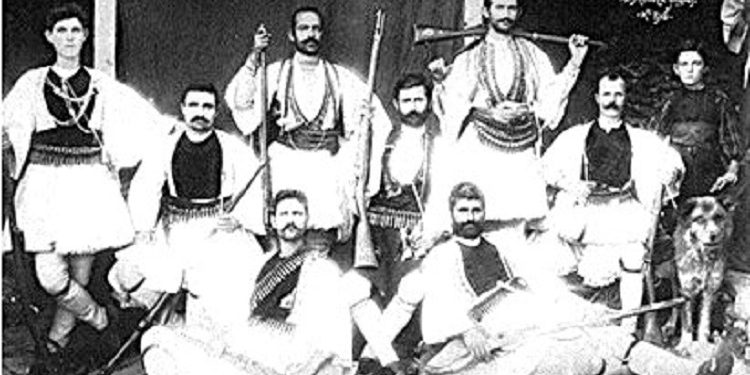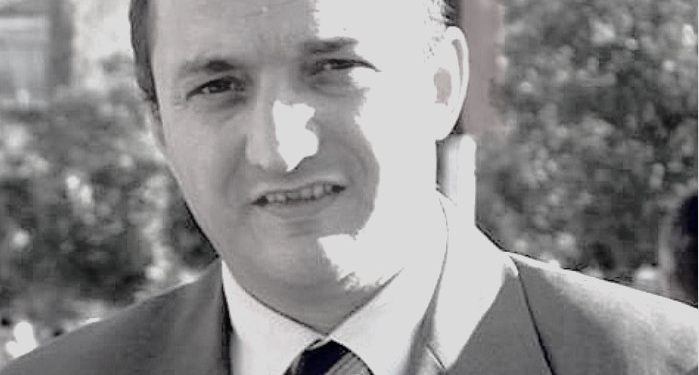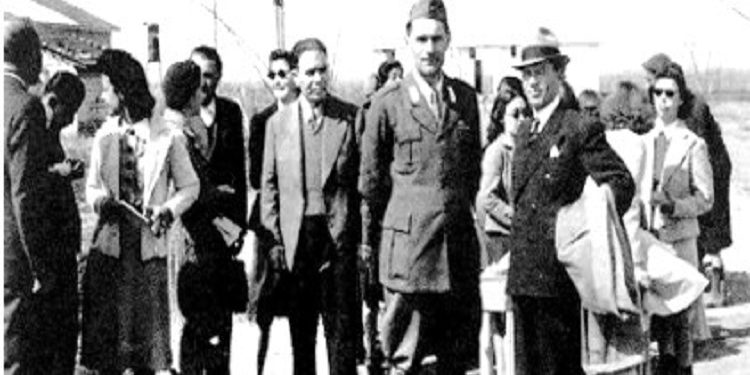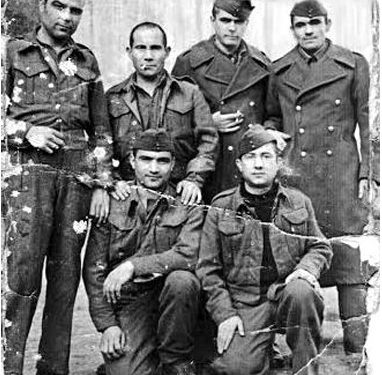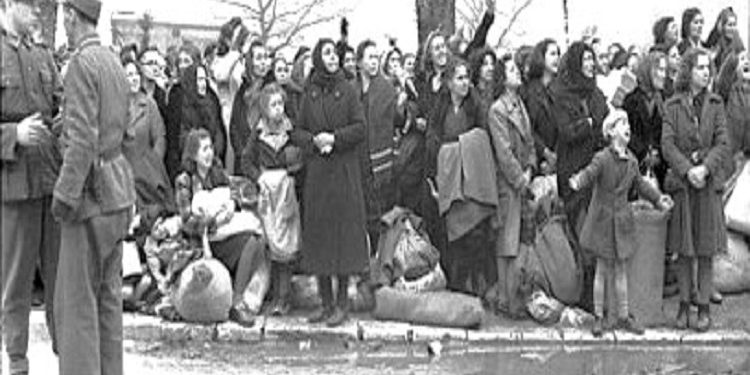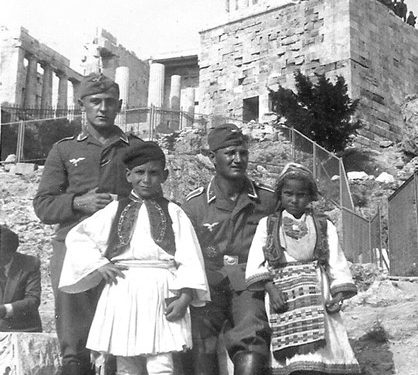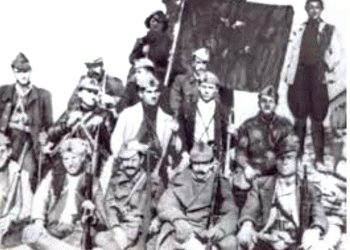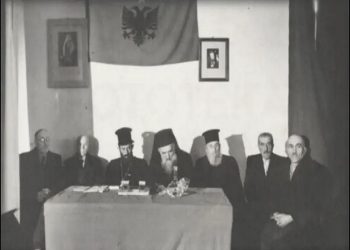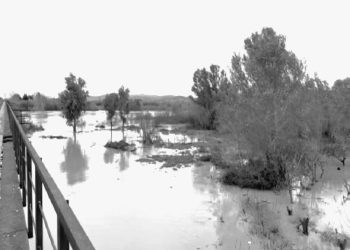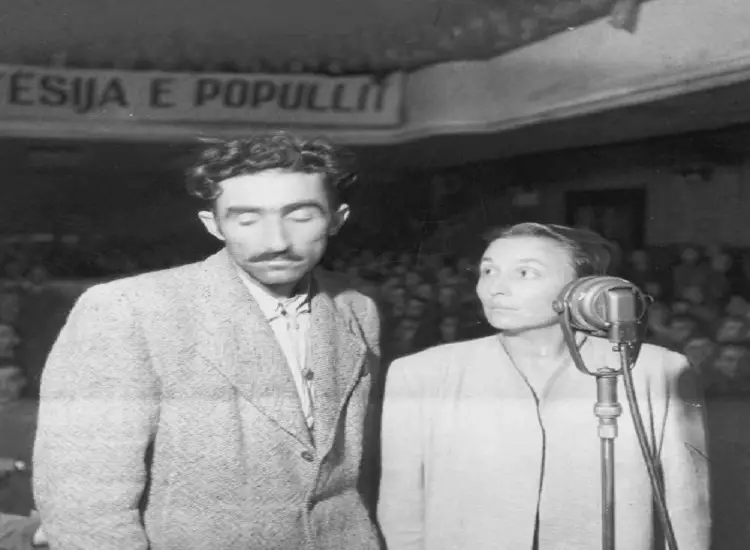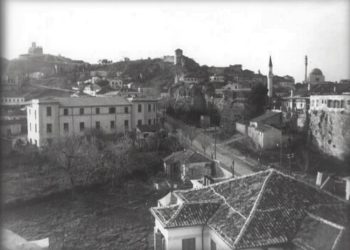By Arben P. Llalla
Part four
ELAS had been dismantled; the left-wing resistance forces were being pursued by government forces, commanded by the Minister of Public Order, Napoleon Zerva.
-The Greek collaborators, designers, and leaders of the genocide in Chameria (1944-1945). The truth about the collaboration of the Cham people with the Germans –
PREFACE
Memorie.al / The period when I started writing the book were from 2008-2016, collecting materials little by little. It was very difficult for me to find original photographs and some Greek newspapers for the years in question. The Greek state and its state structures have been feeding internal and external opinion for about 70 years with books and writings of lies about what actually happened from 1936-1945, regarding the Albanian minority in Chameria-Southern Epirus.
Continued from the previous issue
Vlachs’ cooperation with the Nazi-fascists
(Declaration of the Autonomy of the Principality of Pindus)
During World War I in 1917, the Italian military forces, in order to find support in Greece, proposed the idea of establishing the Principality of Pindus with its center in Meçova. Prince Alqiviadis Diamandi, a Vlach from Samarina in Thessaly, with the profession of lawyer, was chosen to lead this project. During this war, this project did not find widespread support from the Vlach population of Pindus, Prince Alqiviadis Diamandi left Greece after the end of World War I, and settled in Romania.
In World War II, the Greek army, generally led by senior military officers of Vlach origin, easily surrendered to the Italians and Germans. On April 20, 1941, Easter Sunday, the General of the First Corps, the Vlach Panayot Dhemestihas, the General of the Second Corps, Georgios Bako, the Metropolitan of Ioannina Spiridon, who was also a Vlach from Pogonia, signed the surrender and collaboration of the Greek army of Epirus with the Germans. (The Metropolitan of Ioannina, Spiridon, was a rabid anti-Albanian; he had been Minister of the Interior in the government of the Northern Autonomy of Epirus in 1914. The Metropolitan of Ioannina, Spiridon, in 1949-1956, was Archbishop of Greece, he was known among the people by the name “Spiridon Vllehu”, but the family surname was Sito).
After the Greek army of Epirus and Greek Macedonia surrendered, Greek generals of Vlach origin enjoyed ministerial privileges during the governments of 1941-1944. On April 30, 1941, the senior German military officer, Alfred Jod, and the Italian, Alberto Ferrero, elected Prime Minister George Colacoglu as head of the Greek government. Prime Minister George Colacoglu appointed General Panayot Dhemestihas, a Vlach, as Minister of the Interior; another senior military officer, Theodhor Sarantis, also a Vlach, was appointed Prefect of Trikalon. Colonel Theodhosis Papadheothosiu, a Vlach, was elected Prefect of Larissa-Volos. The Vlachs were now ruling Greece, and this helped them to declare the independence of the Principality of Pindus.
In May 1941, Alqiviadhis Diamandi returned to Greece, went to Ioannina and held meetings with the Vlachs there. In the summer of that same year, Diamandi began a tour of Vlach settlements, such as in Samarina, Grevena, Larisa, Trikala, Elassona, and in many villages, holding over 50 meetings in these areas, with Vlachs who had graduated from Romanian and Italian schools. During these meetings with the Vlachs of Pindus, Diamandi opened the offices of the Autonomy of the Principality of Pindus in Meçova, Ioannina, Grevena, etc. On September 25, 1941, Alqiviadhis Diamandi sent a memorandum to Prime Minister George Colakoglu, as a representative of the Vlachs of Pindus and the Vlachs of the Southern Balkans.
Diamandi’s memorandum initially contained several requests: a.) the appointment of prefects, mayors and local leaders, will be determined by him. b.) The dismissal of permanent employees and the transfer of those who are not friendly to this movement. d.) To compensate those who suffered during the Italo-Greek war, and the Vlachs who brought animals, furs and other items to the care of the soldiers. e.) To punish those who had transferred during the Italo-Greek war Romanians who had behaved unpatriotically.
These were the main demands of Alqiviadis Diamandis, addressed to the Prime Minister of the first collaborationist government, George Colacoglu. In the autumn of 1941, the Prince of Pindus, Diamandis moved to Larissa and with the support of the Italians who controlled that territory, founded the army “Roman Legions”. At the head of these troops, which were composed of Vlachs, was Nikolao Matusi, who was born in Samarina and lived in Larissa. The number of Vlachs who were in uniform in the “Roman Legions” was about 2000.
The Vlach military troops operated jointly with the Italian army, which were commanded by the Italian general Ruzero, as in Trikalla, Elasona, Samarina, Grevena, Meçovo, Kallabaka, Larisa, Farsa. They terrorized the population, robbed them of their food and property. Several times the Vlach “Roman Legions” were attacked by the Greek partisan troops of ELAS.
On March 1, 1942, the Vlach intellectuals of Greece and representatives of the Vlachs of Albania, Bulgaria and Serbia signed the “Manifesto of the Vlachs of the Southern Balkans”. At the top of the list of those who signed this Vlach Manifesto was the president of the Vlachs of the Southern Balkans, Alqiviadhis Diamandi, the president of the Vlachs of Pindus, Nikolao Matusi, the president of the Vlachs of Albania, Vasili Varnduli, of Serbia, Micele Tegojani, of Bulgaria, Ziko Area.
Of the Vlach intellectuals of Greece who signed it were: Prof. Dimo Çutra, Dr. Kosta Taxo, Av. Xhorxhio Franko, Prof. A. Beka, Gaqi Papa, Dr. Niko Miçibuna, and Prof. Dim. Kaxhigogo, Av. Kalometro, Colonel Niko Teloni, Colonel Vasilis Giorgos, Prof. Kosta Nikolesco, Prof. Jorgo Kondojani, K. Kaloera, Prof. Virxhilio Balamace, Prof. Miçele Barnda, engineer E. Goxhamani, engineer K. Stefa, engineer Niko A. Beka, Prof. Jorgo Balamate, engineer S. Peleqi, Av. K. Pituli, Av. Dim. Barnda, Av. Toli Haxhi, Joani Kopano, Prof. Zisi Haxhibira, Dr. Serxhio Triandafili, Joani Mercos, Perikli Piteni, Jorgo Gjuleka, Akile Taqi Furkoti, Atanasi Balodhimo.
As can be seen, the names that signed the Vlach manifesto are intellectual figures of Greece, they were not ordinary people, workers, farmers, but elevated, who knew very well what they were signing. After the war, most of them were not severely punished or expelled from Greece, as happened with the Muslim Albanian population of Chameria, on the pretext that they were allegedly collaborators of the Germans. Today, their children or grandchildren are deputies, ministers, prefects, and senior leaders of state institutions in Greece.
At the end of 1943, as it became apparent that the German Axis was losing the war, the leaders of the Wallachian Legions and most of them abandoned this uniform and joined the troops of Napoleon Zervas. The Prince of Pindus, Alciviadis Diamanti, left Greece and settled in Romania. With the coming to power of the communists there, he was arrested in 1948, and died a few months after his arrest in the basements of the Ministry of the Interior in Romania.
The Prime Minister of the Principality of Pindus and the commander-in-chief of the military forces of the “Roman Legions”, Nikolaos Matousi, after the capitulation of fascist Italy in 1943, fled Larissa and went to Athens, where he collaborated with the Germans. After the Liberation of Greece in October 1944, he fled to Romania, after being captured by the Romanian communists; he was imprisoned as a collaborator with the Germans. At the request of Greece in 1964, he was transferred to continue his imprisonment.
At the trial held in Athens in May 1964, the senior leaders of EDES, for Athens, Apostoli Papageorgiou and the political leader, Apostoli Paguco, were called as witnesses for Nikolao Matousi. Only the commander of EDES, Papageorgiou, came as a witness. Nikolaos Matousi in Greece, enjoyed privileges up to the point of carrying weapons with a permit, even though he had been a collaborator with the Germans and Italians, he was never convicted by the Greek courts.
His daughter, Ksenia Matousi was one of the most famous painters in Greece and enjoyed privileges even though her father had been a collaborator with the Italians and Germans, during World War II. Nikolaos Matusi died at an advanced age in 1991, in Larissa.
The Vlach population of Pindus, although officially documented as collaborators of the Italians and Germans, was not expelled from Greece; on the contrary they took over the leadership of Greece, and directly participated in the massacres committed against the Albanian population in Chameria. It is the Vlachs of Pindus who plundered and exploited the wealth of the Chams together with the Orthodox refugees who came from Asia Minor.
According to the historian and journalist Dhimosthenis Koukounas, who has published several books and two volumes about the events of occupied Greece 1941-1944, he brings the names of 8,312 Vlachs who participated in the signing of the March 1942 manifesto and in the Roman Legions, but their number, as we have said above, is greater.
It is interesting that most of the Vlachs who collaborated with the Italians and Germans, their children and grandchildren enjoy privileges and are deputies, historians who have been making anti-Albanian propaganda for years. So, the Vlachs were not persecuted or expelled from Greece as collaborators with the Italians and Germans, for such an unproven accusation that about 25 thousand Albanians of Chameria were unjustly expelled.
From my research I was able to confirm that the children or grandchildren of the Vlachs who collaborated with the Italians and Germans who enjoy privileges are: Ioannis Nikolaos Mercos, born in Nimfeo, Florina. The inhabitants of this village are Vlachs and some of them come from Voskopoja. He was a signatory of the Manifesto of the Autonomy of the Principality of Pindus. After collaborating with the Italians in Larissa, in 1942, Ioannis Mercos moved to Thessaloniki with his family and there he began collaborating with the Nazi Germans.
After the war, he was sentenced to 11 years in prison. His son Nikolaos Ioannis Mercos, born in 1936 in Nympheo, Florina, is a lawyer, writer and has published over 15 books. Nikolaos Mercos, the son of the collaborator of the Italians and Germans, was in 1990-1993, advisor to Prime Minister Konstantinos Mitsotakis, on national issues of Greece. Mercos also collaborated closely with the former president and former prime minister of Greece, Konstantinos Karamanlis.
Nikolaos is an honored figure of the Greek state, but the question arises: How is it possible that the son of a collaborator of the Italians and Germans is entrusted with the leadership of the highest institutions of Greece?! Nikolao Mercos belongs to the anti-Albanian group that promotes the annexation of southern Albania, and is a friend of the Archbishop of the Autocephalous Church of Albania, Anastasios.
The deputy in the Greek Parliament, Konstantinos Gyulekas, of the New Democracy party, is a relative of Georgios Gyulekas, originally from the Vlachs of Samaria. Georgios Gyulekas is a signatory of the March 1942 Manifesto for the Autonomy of the Vlachs of Pindus and was a member of the Vlach armed forces, the Roman Legions, and a collaborator of the Italians and Germans during the years 1941-1944. The fate of Georgios Gyulekas is unknown, but the deputy in question, Konstantinos Gyulekas, comes from the same family.
The Vlach, Konstantinos Gyulekas, is a lawyer by profession and worked as a journalist in the city of Thessaloniki for several years. Since 2000, he has been a New Democracy MP in the Greek Parliament, and has also been a deputy minister several times. Why did the Vlachs of Pindus strive for autonomy within Greece?
During the Ottoman Empire, compared to the Albanians, the Vlachs had more rights. They had primary and secondary schools in their native language, which is close to Romanian. The fight for the assimilation of the Vlachs was fought between the Romanians and the Greeks, which caused the Vlachs to have two national consciences and often fought fiercely against each other. It was the Vlachs of Grevena with a Romanian conscience who killed the Greek Metropolitan Emiliaos in October 1911, because he was propagating their assimilation.
Names of some Vlach collaborators
As we said above, historian and journalist Dhimosthenis Koukounas brought the names of 83 Vlachs who participated in the signing of the Manifesto for Vlach Autonomy of March 1942 and in the “Roman Legions”, who were collaborators of the Italians and Germans.
What is striking is that some of them were not sentenced at all, some to 2-6 years in prison, a small minority to life imprisonment. The Vlachs who declared the Autonomy of Pindus, who officially collaborated with the Italians and Germans by the Greek authorities and after 1944 their families were not persecuted, they were not expelled from Greece.
They were not stripped of their Greek citizenship as happened with the Albanians of Chameria, who, although their collaboration with the Italian and German occupiers was never proven, were massacred, and were permanently expelled from their lands, where they had lived for thousands of years. This classic racist policy of the Greeks, now proven by the books of Greek authors, clearly shows its ethnic and religious division.
Alqiviadhis Konstantin Diamandi, was born in Samarina in 1894, into a wealthy family. During World War I in 1917, he held the rank of non-commissioned officer in the Greek army and operated in the Vlach villages of Pindus. With the support of the Italians, that year he founded the army of the Principality of Pindus and declared himself Prince. For these actions, Diamandis was convicted by the Greek courts, but he was pardoned by the amnesty of 1927.
In 1920-1925, Alqis Diamandis was a Romanian diplomat in Saranda, maintaining contacts with the Romanian and Italian secret services. In the early 1930s, he returned to Greece as a representative of several Romanian timber and oil companies. During this period, Alqiviadis began recruiting Vlachs from Thessaly and Epirus, to establish the Principality of Pindus with its own army. With the arrival of the Germans and Italians in 1941, Diamadi founded the Vlach “Roman Legions”, which were financed by the Italian army.
Nikolao Matusi was elected Prime Minister and Commander of the Principality of Pindus. At the end of 1942, Alqiviadis Diamantis left Greece for Romania. With the coming to power of the communists in 1948, he was arrested and died after a few days in prison.
Nikoloa Mattheo Matusi was born in 1899 in Samarina in Pindus. After graduating from university in Athens, he worked as a lawyer in Larissa. He was a signatory of the Manifesto of the Autonomy of the Vlachs of Pindus, March 1942 and later the commander-in-chief of the Vlach forces, known as the “Roman Legions”. After the capitulation of fascist Italy in 1943, he fled Larissa and went to Athens, where he collaborated with the Germans. After the Liberation of Greece in October 1944, he fled to Romania, after being captured by the Romanian communists; he was imprisoned as a collaborator with the Germans.
At the request of Greece in 1964, he was transferred to continue his imprisonment. At the trial held in Athens in May 1964, the senior leaders of EDES, for Athens, Apostoli Papageorgiou and the political leader, Apostol Paguco, were called as witnesses. Only the commander of EDES, Papageorgiou, came as a witness. Nikolaos Matousi enjoyed privileges in Greece, even to the point of carrying weapons with a permit, even though he had been a collaborator with the Germans and Italians, he was never convicted by the Greek courts. His daughter, Ksenia Matousi, was one of the most famous painters in Greece and enjoyed privileges even though her father had been a collaborator with the Italians and Germans during World War II. Nikolaos Matousi died at an advanced age, in 1991, in Larissa.
Dimosthenis Nikolaos Cutra, born in 1894, was a professor at the Larissa gymnasium. During the Metaxas government, he was dismissed from his job on charges of spreading leftist propaganda to the gymnasium students. As early as 1941, he joined Diamandis’ idea for the Autonomy of the Vlachs of Pindus, and was a signatory of the March 1941 Manifesto. He was the leader of the Vlach “Roman Legions”. After the war, he was sentenced to death in absentia. He died in 1961, hiding in the outskirts of Larissa.
Constantin Taha, born in Larissa, was a doctor by profession. He was a signatory of the Vlach Manifesto and in May 1941, founded the first Vlach “Roman Legion” in Larissa. He was the main leader of the “Roman Legions” center in Larissa. After the war, he was sentenced to 15 years in prison.
Vasileos Kristo Rapotika, born in 1888, in Gramusta of Pindus. He was one of the first founders of the “Roman Legions”. He participated in several battles with the Italians against the ELAS forces. He was killed in 1943, by ELAS.
Thoma Dhimitër Pispirigos, was a lawyer from Samarina. He was a fanatic of propaganda for the Autonomy of the Vlachs and an anti-Greek. During the time of the movement of the Principality of Pindus, he joined the Italian army and received the rank of colonel. He was a member of the “Roman Legions” and in Thessaloniki he was the president of the Romanian Community. After 1944 he fled to Romania, where he died.
Nikolao Miçibuna, was a doctor from Grevenaja and a signatory of the Manifesto. He became the main leader of the Vlach Autonomy movement in Grevena. After the capitulation of Italy in 1943, he settled in Thessaloniki. After the war he was arrested and sentenced to life imprisonment. / Memorie.al




